Last week, Japanese financial giant SBI Group announced a series of blockbuster announcements: first, it partnered with Circle, Ripple, and Startale, and then partnered with Chainlink to jointly promote stablecoins, RWA tokenization, and cross-border payment solutions. In just a few days, SBI quickly transformed itself from a traditional financial institution to one of Japan's most active Web 3 investors.
This isn't just a simple business collaboration; it's a signal from SBI to the market: it's poised to seize the opportunity presented by the next wave of financial infrastructure transformation, evolving from a financial services provider to a digital asset infrastructure provider. Against the backdrop of the upcoming launch of the Japanese yen stablecoin and the gradual formation of the Asian Crypto Corridor, SBI's move undoubtedly puts it at the forefront of Japan's financial digital transformation.
Traditional financial giants are building Japan's digital financial landscape
SBI's story dates back to 1999, when it was SoftBank Investment, a subsidiary of SoftBank. After becoming independent in 2006, the company officially changed its name to SBI Holdings, Inc., headquartered in Tokyo. Initially, its core businesses were securities, banking, and insurance, and it subsequently expanded into asset management and biotechnology, becoming a comprehensive group spanning finance and healthcare.
Over two decades later, SBI has grown from the "little brother" it once was to a formidable player in Japan's financial market. It is even seen as the strongest challenger to the "Big Three" (Mitsubishi UFJ, Sumitomo Mitsui, and Mizuho)—a candidate for the title of "fourth largest bank." Today, SBI's business framework is organized around five key sectors: financial services, private equity, asset management, crypto assets, and next-generation businesses. This diversified strategy not only established it in the Japanese market but also laid a natural foundation for its subsequent foray into the digital asset sector.
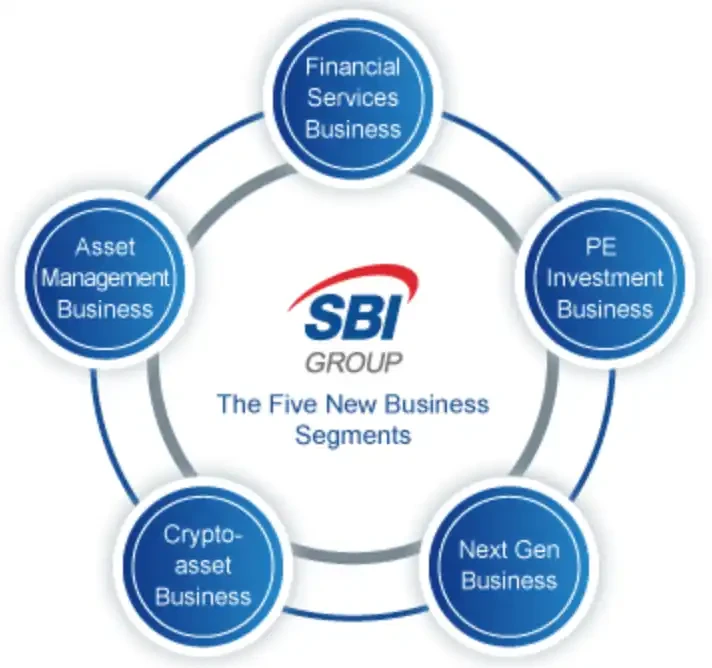
More importantly, SBI isn't just jumping on the bandwagon. Behind its recent flurry of partnership announcements lies its long-standing involvement in the crypto ecosystem. Leveraging its traditional financial foundations in securities and asset management, SBI has gradually expanded its reach through its subsidiaries into trading, payments, custody, lending, and liquidity services, virtually establishing the entire infrastructure of digital finance. At the same time, SBI has also embraced the emerging Web 3 landscape, testing the waters in areas ranging from NFTs and decentralized finance to the tokenization of real-world assets. More crucially, SBI has boldly aligned itself with international giants: Ripple, Circle, and R3 are all collaborating with it to explore new possibilities in stablecoins, cross-border payments, and tokenization.
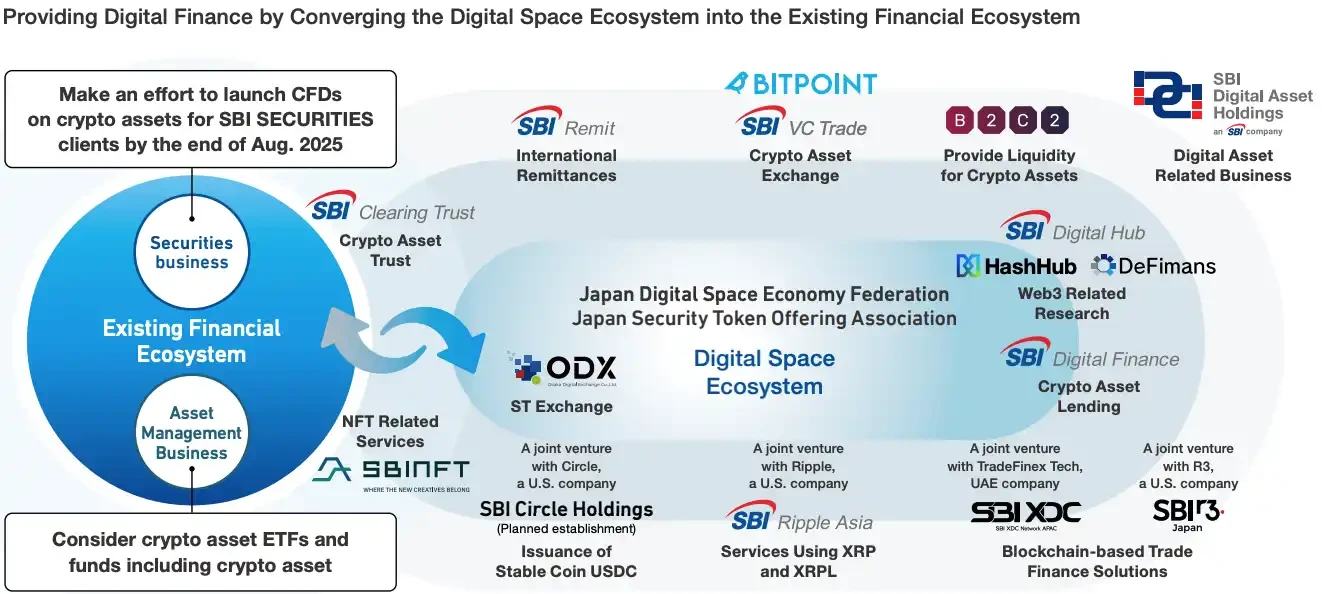
In other words, today's SBI is no longer just a traditional financial group in Japan, but more like a rare "dual engine" in East Asia - while taking root in the fertile soil of traditional finance, it is also accelerating forward in the wave of crypto finance.
From Zero to One: SBI Wins Japan's Only Stablecoin License
In the stablecoin market, SBI has taken full advantage of its "first-mover compliance" advantage. As early as 2023, when the Japanese Financial Services Agency relaxed its ban on the domestic issuance of foreign stablecoins, SBI keenly sensed an opportunity and quickly signed a strategic partnership with Circle. Just one year later, its SBI VC Trade platform completed USDC trading registration, becoming the first and only company in Japan to hold a stablecoin license and the first to bring USDC to market.
Soon after, SBI and Circle established a joint venture, Circle SBI Japan, dedicated to promoting USDC in Japan. When Circle went public in June 2025, SBI invested another $50 million, further cementing their relationship. Last week, the two companies expanded their collaboration, planning to further integrate USDC into cross-border payments and digital financial services. This series of moves not only positions SBI as a leader in compliance and infrastructure, but also positions it as a key bridgehead for Circle in expanding into the Asian market. The digital asset business also delivered impressive results: in 2024, related revenue reached 80 billion yen, a year-on-year increase of over 40%, and the number of users doubled from 800,000 to 1.65 million in just one year.
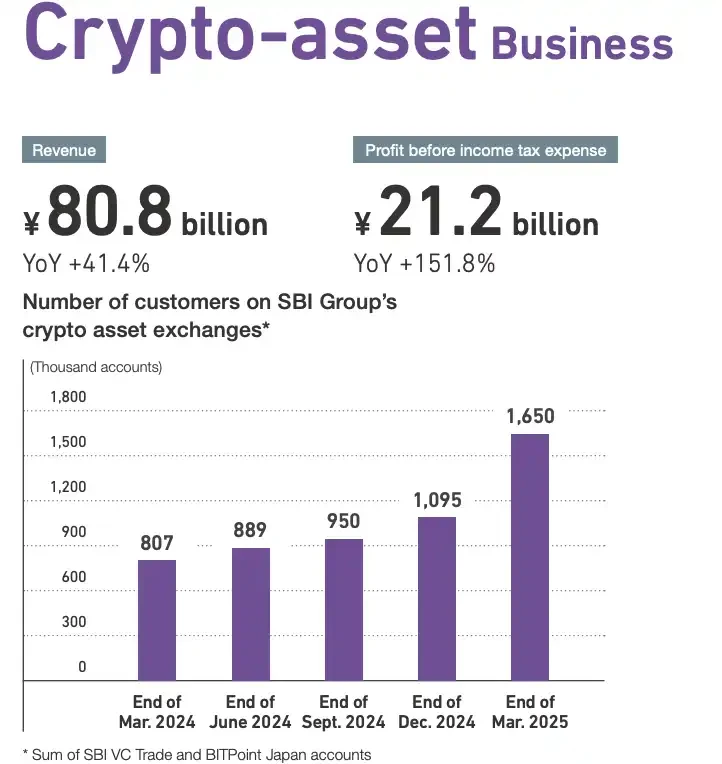
If USDC is SBI's "entry point" into the world of stablecoins, then Ripple's RLUSD is its "bridge" for cross-border payments. Just last week, SBI announced it would introduce RLUSD to the Japanese market, with a planned launch in the first quarter of 2026. The design philosophy behind this stablecoin is simple: combining the stability of the US dollar with the speed of the blockchain, ensuring compliance, transparency, and instant settlement. For example, if a US user wants to send US dollars to Japan, the funds will first be converted into XRP, transferred across the blockchain in seconds, and then exchanged back to Japanese yen in Japan. RLUSD serves as the anchor asset, ensuring the stability and trustworthiness of cross-border funds.

By collaborating on two fronts with Circle and Ripple, SBI has virtually established a comprehensive stablecoin portfolio: USDC handles payments and trading, while RLUSD focuses on cross-border settlement and enterprise services. These two parallel tracks have firmly established SBI at the center of the Asian stablecoin landscape.
Rising RWAs: SBI Builds Japan's Robinhood
Beyond stablecoins, SBI has also set its sights on RWA (tokenized real-world assets). This sector has been one of the fastest-growing over the past two years, jumping from $5 billion at the beginning of 2023 to nearly $30 billion today, a more than fivefold increase. Bonds, funds, and government bonds are currently the mainstream applications, but equity assets still account for less than 1%, presenting enormous potential.
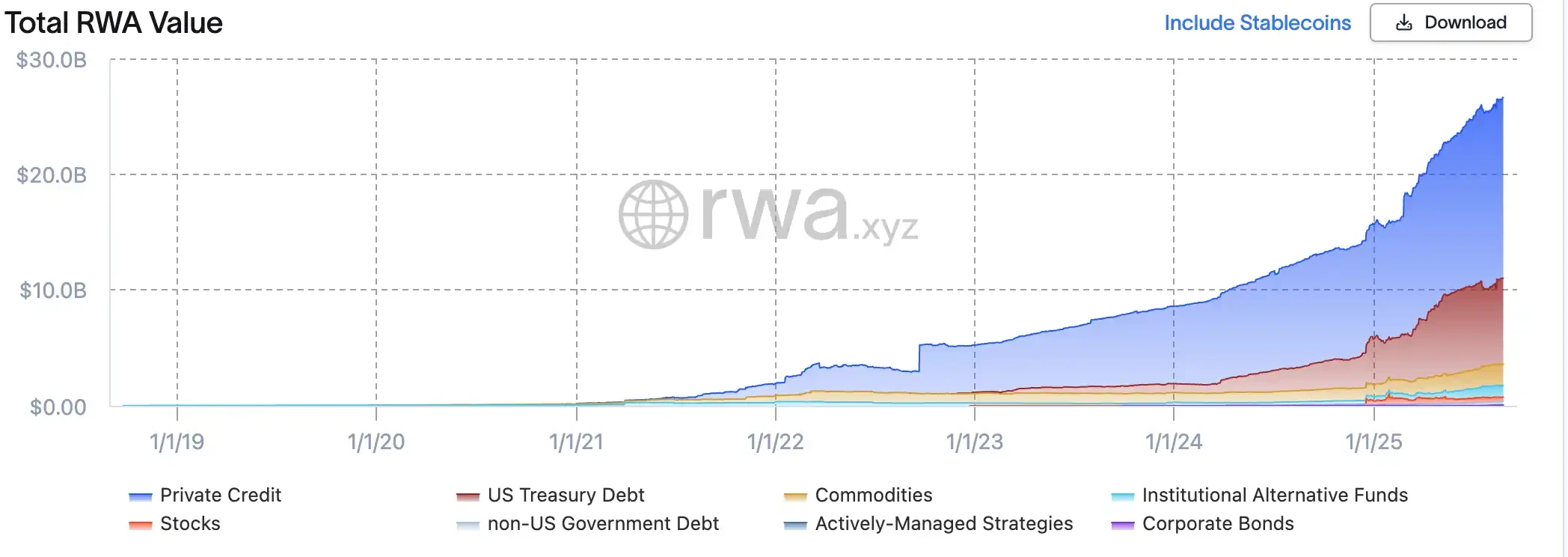
Imagine buying a bond. Previously, you'd have to wait several days for settlement to arrive, but once it's on-chain, it's instant, like a money transfer. Another example: a mutual fund traditionally has high investment barriers and slow redemptions. But after tokenization, it becomes like a "digital ticket" that can be bought and sold 24/7. For investors, this offers unprecedented convenience; for institutions, it significantly improves capital efficiency. It's no wonder that international giants like Gemini, Kraken, and Robinhood have launched similar 24/7 tokenized trading platforms.
SBI clearly doesn't want to be left behind. In 2025, the group partnered with Web 3 infrastructure company Startale to establish an on-chain tokenization platform in Japan, securing "milestone-based committed funding" with the goal of building a complete system encompassing issuance, clearing, custody, and cross-chain interoperability.
Crucially, SBI didn't go it alone; it brought in Chainlink, a global leader in blockchain technology. This company excels at interoperability between blockchains. Simply put, it enables the smooth transfer of tokens across different chains, much like interbank transfers between different banks. Chainlink will help SBI ensure the security and compliance of cross-chain transactions when tokenizing assets like bonds and real estate. Furthermore, Chainlink will bring the fund's net asset value (NAV) data to the blockchain, ensuring transparency and enabling investors to track asset value at any time. Its Proof of Reserve technology will also provide on-chain verification for stablecoins and funds, mitigating the risk of a disconnect between "paper assets" and actual reserves.
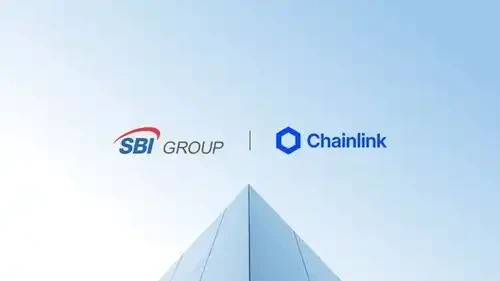
If Robinhood's significance in the US is to bring stocks and crypto derivatives to retail investors with zero barriers to entry, then SBI is pursuing a similar path in Japan. Leveraging its deep foundation in securities and banking, coupled with its pioneering work in stablecoins and RWAs, SBI is striving to make tokenized assets a popular investment channel. For Japanese investors, this not only means 24/7 stock and bond trading, similar to money transfers, but also allows them to directly participate in the global crypto financial market within a compliant and secure framework. In other words, SBI's RWA platform is more than just a technological upgrade; it's a "Robinhood-style" experiment in financial inclusion, potentially marking a watershed moment for Japan's capital market's official entry into Web 3.
From the fourth-largest bank to a digital asset infrastructure giant
For SBI, entering the crypto world wasn't a whim; it was a natural progression of its strategy. Japan has long been experiencing an ultra-low interest rate environment, and traditional financial services like banking and securities have become highly homogenized, leaving little room for profit. Meanwhile, global stablecoins and the tokenization of real-world assets (RWAs) are entering a regulatory compliance fast lane. Japan's Financial Services Agency (FSA) relaxed stablecoin regulations in 2023, effectively giving the green light to this new sector. Rather than wait and see, SBI acted decisively, partnering with international partners like Circle and Ripple to leap from industry spectator to rule-maker, securing a leading position in two of the most promising sectors: stablecoins and RWAs.
On a deeper level, this isn't just a business expansion; it's a transformation in identity. SBI used to be considered "Japan's fourth-largest bank," but now it's attempting to upgrade itself to "the first infrastructure giant of the digital asset era." SBI is already preparing to launch Japan's first Bitcoin futures on the Osaka Dojima Exchange and has set a goal of increasing digital asset business profits to 50 billion yen by fiscal 2028, representing a 150% increase. This suggests that SBI's ambitions extend beyond traditional finance. Its true bet is on a future where Japan's financial system is deeply integrated with blockchain. In other words, SBI isn't simply betting on the price fluctuations of crypto assets; it aims to become a key player in the restructuring of the new global financial order.
- 核心观点:SBI转型数字资产基础设施巨头。
- 关键要素:
- 唯一持有日本稳定币许可证。
- 与Circle、Ripple等深度合作。
- 数字资产业务年增超40%。
- 市场影响:推动日本金融数字化进程。
- 时效性标注:中期影响。



